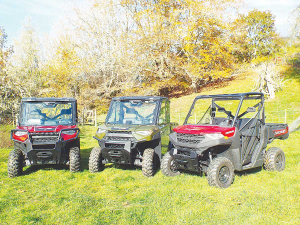Polaris unveils mid-size utility side-by-side
Polaris Off Road has unveiled the 2026 Ranger 500, an all-new mid-size utility side-by-side aimed at bringing the quality and reliability of the American brand into the value segment.
 Polaris’s flagship models: the Ranger 1000 EPS, the Ranger 1000 HD-EPS and the Ranger Diesel HD-EPS.
Polaris’s flagship models: the Ranger 1000 EPS, the Ranger 1000 HD-EPS and the Ranger Diesel HD-EPS.
On-farm transport was revolutionised with the arrival of quads, but really came of age with side-by-sides.
Polaris has carved a name for itself with the latter, particularly with its Ranger series, that first saw the light around two decades ago with the concept of making an ATV with side by side seats for a driver and passenger. The first Ranger was a 6x6 that over the years evolved into a 4x4, along the way picking up more power, better suspension, more comfort and more seats.
Dairy News recently took a closer look at three of Polaris’s flagship models: the Ranger 1000 EPS, the Ranger 1000 HD-EPS and the Ranger Diesel HD-EPS.
All three feature a robust chassis with double A-arm suspension at each corner, offering excellent ground following characteristics, shock absorption and good ground clearance.
The Ranger 1000 EPS is fitted with a SOHC twin-cylinder, fuel injected engine delivering 61hp, mated to the Polaris PRO-PVT transmission, a variable belt drive layout, with shaft final drives.
As more throttle is applied, take up is smooth and the vehicle is easy to control, particularly at low speeds.
Drive selections are controlled via a large, dash-mounted shift lever, with high/low/neutral/reverse and park options, while 2WD, 4WD and Turf Mode choices are via a rocker switch, also in a central location. Trialled in mixed conditions, including flat pasture, rugged bush and soft riverbanks, the vehicles handled everything with ease, with power delivery, smooth, linear and easy to control.
Moving onto the bigger, petrol brother, the Ranger 1000 HD-EPS, which carries over many of the mechanical functions from the more basic machine, was packed with useful extras to make it a standout in this very competitive sector.
You get five inches more cabin room and more comfortable cushioned seats with adjustable slides.
Also, the six cup holders, two drinks holders and numerous stowage areas in the dashboard and under the flip-up passenger seats make the HD very practical to live with.
Power is provided by a DOHC 82hp fuel injected unit that is never wanting in any task and is particularly suited to towing heavy loads, up to 1134kg in difficult terrain. Add in a load bed capacity of 454kg and you can see this vehicle is a workhorse. A dash mounted rocker switch offers three engine modes, with power, work and standard on tap. Our test vehicle had the optional Farm Pack, which includes a windscreen, surely a must-have in Performance mode, as nailing the throttle certainly makes your eyes water.
Third machine off the rank, the Diesel HD, will certainly find followers in the rural community for its frugal fuel use. Although a little noisier than its petrol-powered cousins, this is no slouch, quickly building revs and topping out at 65km/h.
Power is provided by a 900cc, three-cylinder Kubota engine with mechanical injection that pushes out around 25hp. A standout during our test drive was the low-down torque that meant shifting heavy loads and tackling inclines was a breeze, and tackling descents with heavy loads behind was very controlled with good engine braking.
Indeed, all three models showed excellent retardation on downhill sections, which could be accentuated by using the Active Descent Control Function, selected by rocker switch, that made things feel particularly safe.
Complimented by disc brakes all round, stopping should never be a worry, while using high speeds, when safe to do so, is helped by a progressive suspension set-up, with difficult terrain handled with ease, aided by the ground clearance of around 28cm.
In summary, if you need to move three people safely around a property, these three machines certainly warrant a closer look.
The Meat Industry Association of New Zealand (MIA) today announced that Chief Executive Officer Sirma Karapeeva has resigned from the role.
The winners of the 2026 Hawke’s Bay/Wairarapa Dairy Industry Awards were announced at the annual awards dinner held at Copthorne Solway Park in Masterton on Thursday evening.
Environment Southland is welcoming this week’s decision by the Environmental Protection Authority (EPA) to approve the release of Blaptea elguetai, a leaf‑feeding beetle that will help control the highly invasive Chilean flame creeper.
This March, the potato industry is proudly celebrating International Women’s Day on 8 March alongside the International Year of the Woman Farmer, recognising the vital role women play across every part of the sector — from paddocks and packhouses to research, leadership, and innovation.
Fruit trader Seeka posted a record profit and returns to shareholders in 2025.
Recent weather events in the Bay of Plenty, Gisborne/Tairawhiti, and Canterbury have been declared a medium-scale adverse event.